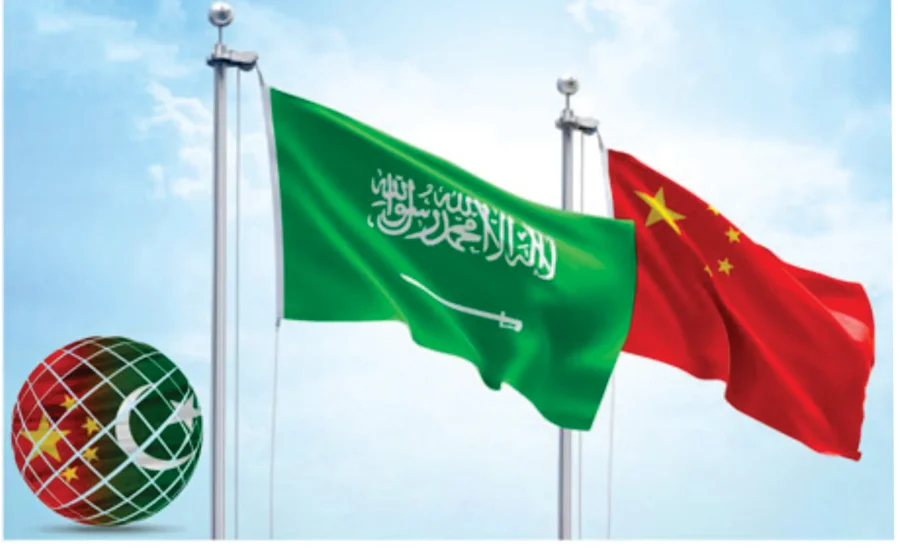A “harmonization plan” between China’s Belt and Road Initiative and Saudi Arabia’s Vision 2030 framework has ensured bilateral trade remains robust, and it has opened up opportunities for people-to-people exchanges, according to a top Saudi diplomat. The bilateral comprehensive strategic partnership “contributes to enhancing the chances of successful cooperation between Saudi Arabia and China for the benefit of the two countries and their peoples”, said Abdulrahman bin Ahmed Al-Harbi, Saudi Arabia’s ambassador to China, during an exclusive interview with China Daily.
China has remained Saudi Arabia’s top trading partner, with bilateral trade hitting $116 billion in 2022, up 34 percent year-on-year. In the first quarter of 2023, bilateral trade surpassed $27 billion, up 9.7 percent compared with the same period last year, according to data provided by Saudi Arabia. “Saudi-Chinese relations are characterized by great distinction, which reflects positively on the strengthening of cooperation between the two countries, and is in line with the development witnessed by the world and the changes of the times,” Al-Harbi said.
Chinese President Xi Jinping made a state visit to Saudi Arabia last December, while Saudi Crown Prince Mohammed bin Salman Al Saud visited China in 2019. A number of agreements were signed during these visits, Al-Harbi said. In 2019, the two countries signed some 35 deals worth more than $28 billion, while in 2022, more than 40 agreements worth over $58 billion were signed. Some cooperation agreements were also signed last year in sectors targeted by both sides, the ambassador said. These included sectors such as renewable energy, petrochemicals, information technology and infrastructure.
Al-Harbi said that Saudi Arabia’s Vision 2030 strategic framework has adopted various economic reforms to raise the percentage of foreign direct investment contribution to GDP and improve the business environment, making it one of the most attractive FDI destinations. Reforms included simplifying administrative and regulatory procedures; improving infrastructure, technology and other regulations aimed at overcoming challenges for investment and creating promising investment opportunities to advance economic development in the country, according to the diplomat.
Saudi Arabia works in cooperation with many partners in the public and private sectors in the two countries to create investment opportunities and attract investment, he said, adding that his country “provides a supportive infrastructure, and an attractive, stimulating and safe investment environment”. “Currently, there are many Chinese companies and factories … operating in various sectors and fields. We commend their role and always welcome them. Chinese companies have a long and honourable track record due to their active presence in the Saudi market and through the implementation of numerous mega projects in various fields,” Al-Harbi said. He noted that Chinese companies enjoy a growing market because of their expertise and advanced technologies in the manufacturing process.
Since he took office last July, the ambassador has visited several provinces, autonomous regions and the Hong Kong and Macao special administrative regions of China, as well as top businesses. Al-Harbi was in Hong Kong and Macao SARs between May 30 and June 2. In the HKSAR, he met with chief executive John Lee Ka-chiu and Legislative Council President Andrew Leung in the presence of Saudi Consul General to the Hong Kong and Macao SARs Hamad Mohammed Al-Jebreen. They discussed opportunities ranging from developing trade relations to promoting industrial cooperation. The ambassador also met with Liu Guangyuan, Commissioner of the Ministry of Foreign Affairs in the HKSAR.
In the Macao SAR, Al-Harbi exchanged views with Chief Executive Ho Iat-seng on ways to enhance cooperation between the two sides in various fields. He also reviewed future cooperation opportunities in a meeting with Liu Xianfa, Commissioner of the Ministry of Foreign Affairs in the Macao SAR. “I strongly believe that Chinese corporations are willing to continue their investment … as their investment contributions add value to the Saudi economy. Undoubtedly, opportunities (in Saudi Arabia) … are promising and numerous in various fields,” Al-Harbi said.
The Saudi government established four new special economic zones with favourable taxation policies on April 14 — King Abdullah Economic City SEZ, Jazan SEZ, Ras Al Khair SEZ and Cloud Computing SEZ. Chinese companies are already operating in these special economic zones. The ambassador praised the “exceptional capabilities that the two countries have”, as well as noting the unique advantages that Saudi Arabia possesses, which are being “harnessed to build a more diversified and sustainable economy”.
Apart from being a strategic geographical location linking three continents, Saudi Arabia also has energy resources and skilled young people, while it is the largest economy in the region, he said. The country recorded the highest annual GDP growth of 8.7 percent among the G20 countries in 2022. Aside from economic advancements, Al-Harbi also praised China’s contributions to restoring stability in the Middle East. He said, “President Xi’s initiative and China’s sponsorship of the talks between Saudi Arabia and Iran contributed to strengthening peace in the region. The two countries – KSA & Iran – agreed to reopen their diplomatic missions, which contributed to maintaining stability and enhancing the chances of development plans being successful in the region.”










